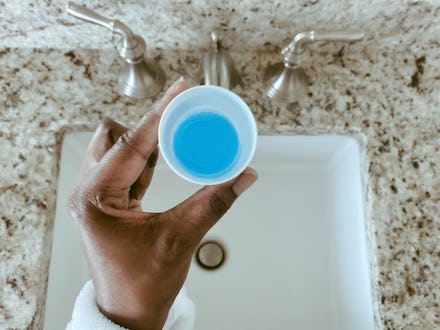The truth about that study on mouthwash and coronavirus

A study has found that certain mouthwashes can kill the novel coronavirus in 30 seconds in the lab, suggesting they may help destroy the virus in saliva. Anything found to kill the virus is exciting, but that’s not a green light for you to rush your drugstore’s oral care aisle. Alas, mouthwash is not your coronavirus savior. There’s still no evidence it can treat or prevent the spread of the virus, the BBC reports.
Cardiff University researchers uploaded the study last Friday to bioRxiv, a repository for preprints, or drafts of papers that haven’t yet undergone the stringent review process required for publication in a scientific journal. And quite frankly, the headlines that followed have been slightly overzealous. In the study, researchers exposed novel coronavirus (SARS-CoV-2) to various commercially-available mouthwashes for 30 seconds, under lab conditions meant to mimic the nasal/oral cavity.
Two mouthwashes containing 0.07% to 1% cetypyridinium chloride, or CPC (Dentyl Dual Action and Dentyl Fresh), and one containing 23% ethanol with ethyl lauroyl arginate, or LAE (Listerine Advanced) showed the greatest level of virus inactivation. This is consistent with earlier findings that CPC-based mouthwashes could lower viral load, per the BBC.
The Cardiff University study suggests mouthwashes containing these ingredients may help kill the novel coronavirus in saliva, according to the BBC. But since mouthwash doesn’t enter the respiratory tract or lungs, we don’t have evidence that it can treat COVID-19.
The study authors have submitted it for journal publication, and a clinical trial will validate whether the lab findings also hold up in COVID-19 patients, the BBC explains. Specifically, the trial will look at whether it helps lower novel coronavirus levels in the saliva of COVID-19 patients at a Cardiff hospital. The researchers expect to have results by early next year.
The clinical trial will “show us how long any effects last, following a single administration of the mouthwash in patients with COVID-19,” David Thomas, professor of oral and maxillofacial surgery at Cardiff University, who co-authored the new lab study, told the BBC. It wouldn’t yield evidence of whether it can prevent spread, though. Richard Stanton of the Cardiff University School of Medicine, the lab study’s lead author, urged people to continue practicing measures known to prevent COVID-19, such as social distancing and frequent hand washing.
The lab findings on mouthwash and the novel coronavirus are encouraging. But even if a clinical trial does demonstrate that mouthwash can kill the novel coronavirus in saliva, that’s not the same as showing it can prevent or treat COVID-19.
So gargle mouthwash if you want to keep your breath minty fresh, but the best thing you can do right now is to prevent COVID-19 in the first place by following everything Anthony Fauci and other experts have repeated over and over: Wash your hands often, socially distance, cover sneezes and coughs, clean frequently-touched surfaces, and wear a mask.